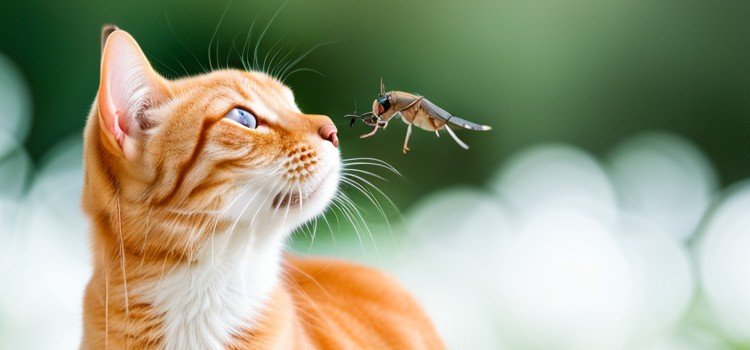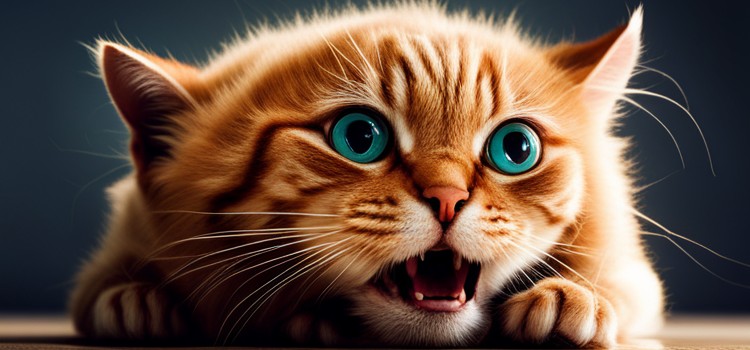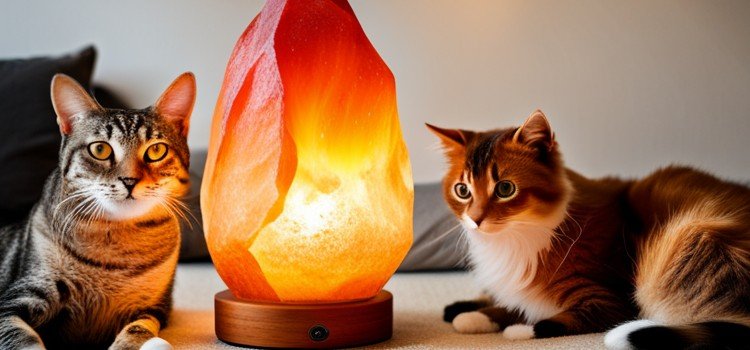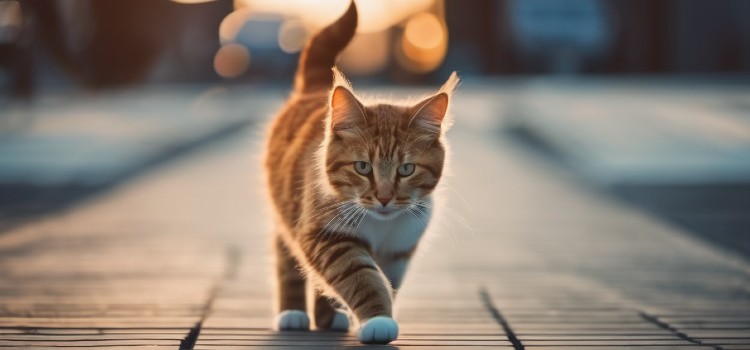As an Amazon Associate committed to the mission of improving the lives of our readers, Live-Clear.com receives a small commission from eligible purchases made through our affiliate links. This revenue enables us to keep producing insightful articles and other material.
Possible answer: Cats may pee on stoves for various reasons such as marking territory, stress, medical issues, or dislike of the litter box. Having a cat pee on the stove can be frustrating and concerning for pet owners.
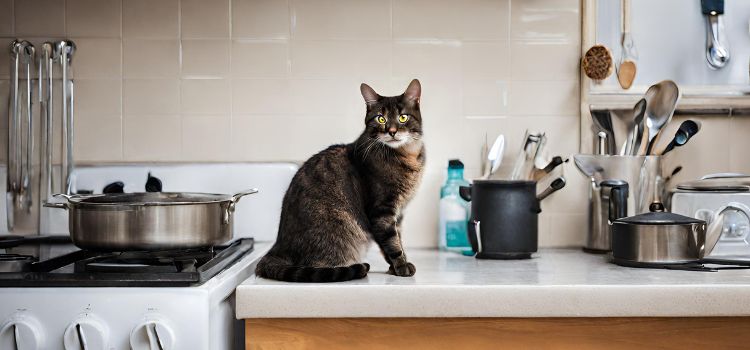
Beyond the unpleasant odor and mess, the behavior may signal an underlying problem that needs to be addressed. While it can be challenging to pinpoint the exact cause of the behavior, understanding some common triggers and taking steps to prevent or treat them can help to prevent further accidents and keep both you and your feline friend happy and healthy.
We will explore some possible reasons why cats pee on stoves and offer practical tips for solving the issue.
Territory Marking: Why Does My Cat Pee On the Stove
Cats may pee on the stove to mark their territory. This behavior is more common among unneutered male cats who mark their scent to establish dominance. Providing them with a specific litter box and frequent cleaning may help prevent this behavior.
When it comes to cats and their behavior, there can be several reasons why they pee on the stove, and one of them is territory marking. Cats are territorial animals and have a strong sense of smell. They use this sense to mark their territory, which can include urinating on high surfaces like stoves, countertops, and tables.
Strong Sense Of Smell
Cats have an incredible sense of smell that is far better than humans. They use this sense to communicate with each other, marking their territory, and identifying their prey. Furthermore, a cat’s sense of smell is crucial in finding their way back home.
Urinating On High Surfaces
Cats are also attracted to high surfaces. They love to climb and explore, and this includes jumping on counters and stoves. From their elevated position, they can keep an eye on their surroundings, and with their keen sense of smell, they can easily mark their territory by urinating on these surfaces.
Spraying Behavior
Another reason why cats pee on stoves could be due to their spraying behavior. As mentioned earlier, cats use urine to mark their territory, and spraying is one way they do this. Unlike regular urination, spraying is characterized by small amounts of urine that are sprayed or dripped onto various surfaces. This behavior is often seen in male cats, but female cats can also exhibit this behavior.
When it comes to cats peeing on the stove, territory marking is one of the reasons why this behavior occurs. Understanding why your cat engages in this behavior can help you find practical solutions to stop it. In addition, seeking advice from a veterinarian or behavioral specialist can also prove beneficial.

Litter Box Issues: Why Does My Cat Pee On the Stove
Cats are generally clean animals, and they prefer to use the litter box when nature calls. However, there are some circumstances that may lead them to find alternative locations to relieve themselves. One of the most common reasons why your cat may pee on the stove is due to litter box issues. In this section, we will discuss the different litter box issues that could be the culprit behind your cat’s behavior.
Dirty Litter Box
Cats are hygienic creatures, and they won’t use a dirty litter box. So, if you haven’t cleaned the litter box in a while, your cat may seek other locations to do their business. As a rule of thumb, you should scoop the litter box at least once a day and change the litter completely once every week. A dirty litter box can also cause health problems for your cat and have an unpleasant odor.
Litter Type and Depth
The type of litter you use could also be the reason why your cat is avoiding the litter box. Some cats are picky when it comes to the type of litter they use. For instance, scented litters can be a turnoff for some cats. Additionally, if the litter is too deep, it can be uncomfortable for the cat to use, especially for small kittens or senior cats. As a pet owner, you should experiment with different litter types until you find the one that your cat likes the most. The litter box should have enough litter to allow your cat to bury their excrement, but not too much that it becomes difficult for them to move around.
Location of the Litter Box
The location of the litter box could also be contributing to your cat’s erratic behavior. If the litter box is situated too close to their food or water bowls, or in a noisy or high-traffic area, your cat may be hesitant to use it. Cats prefer a quiet, private location to do their business, and it’s crucial to provide them with an appropriate location to avoid peeing on your stove.
Ensuring a clean litter box, using the right litter type and depth, and providing a suitable location are some of the essential considerations to eliminate litter box issues as the cause of your cat’s inappropriate peeing behavior. By being attentive to your pet’s litter box needs, you can help your furry friend feel comfortable and secure while keeping your stove clean and sparkly.
Stress And Anxiety: Why Does My Cat Pee On the Stove
Our feline friends are sensitive creatures, and changes in their environment can trigger feelings of anxiety and lead to inappropriate urination. Here are some factors that can cause stress and anxiety among cats:
Recent Changes In Household
One possible reason for your cat acting out and urinating on the stove could be due to recent changes in your household. This could be anything from a change in your cat’s routine to rearranging furniture, or even bringing in a new pet to the home. Cats are creatures of habit and any sudden change to their daily routine can cause significant stress.
Lack Of Attention Or Playtime
Sometimes cats might engage in destructive behavior like peeing on the stove because they’re feeling neglected, bored, or lonely. If there’s not enough playtime or interaction, they may act out in other ways to seek attention. Ensure you’re giving your cat enough stimulation, love, and affection to prevent such behavior.
Separation Anxiety
Just like dogs, cats can also experience separation anxiety, and inappropriate urination is one of the symptoms. If your cat is peeing on the stove when you’re not around, it could be a sign of separation anxiety. Ensuring your cat has plenty of toys, scratching posts, and a comfortable spot to retreat to when you’re not there can be helpful in reducing anxiety.

Medical Issues: Why Does My Cat Pee On the Stove
Cat owners often assume that their feline friends pee outside of the litter box due to behavioral issues. However, sometimes medical conditions can also be the cause of this problem. In this section, we will discuss some of the common medical conditions that can cause your cat to pee on the stove.
Urinary Tract Infection
A urinary tract infection is a common condition in cats that affects their bladder and urethra. It causes your cat to feel discomfort while urinating, leading to them seeking other places to relieve themselves.
If your cat is suffering from a urinary tract infection, they may also show other symptoms such as blood in their urine, frequent urination, and excessive licking of their genital area. A visit to the vet is necessary for a proper diagnosis, and they will prescribe antibiotics to treat the infection.
Kidney Disease
Cats with kidney disease exhibit symptoms such as frequent urination, increased thirst, and weight loss. They may also experience decreased appetite, vomiting, and dehydration.
Cats with kidney disease have trouble concentrating their urine, causing them to produce urine in greater quantities than they can hold. This leads to them seeking other places to pee, including the stove.
Kidney disease can’t be cured, but it can be managed with medication recommended by your vet.
Diabetes
Diabetes is a condition that affects cats’ ability to regulate their blood sugar levels. It causes them to urinate more frequently than usual. Cats with diabetes may also show symptoms such as increased appetite, weight loss, lethargy, and vomiting. If you notice any of these symptoms in your cat, take them to the vet for a proper diagnosis. Your vet will prescribe insulin to treat the disease, which can help reduce the frequency of your cat’s urination.
It’s important to identify and treat the medical cause that is making your cat pee on the stove. If left untreated, these conditions can progress and seriously impact your cat’s quality of life. So, if your cat is peeing outside of the litter box, take them to the vet for a thorough examination to identify the cause and start a treatment plan.

Behavioral Problems: Why Does My Cat Pee On the Stove
Cats may sometimes pee on the stove due to behavioral issues. This behavior can be triggered by stress, anxiety, and territorial marking. It is important to identify the root cause and take appropriate measures to prevent it from happening again.
Cats are mysterious creatures, and their behavior can sometimes be confusing for their owners. One of the most common problems that cat owners face is their cat peeing on the stove. While there could be many reasons why your cat is doing this, one of the most common reasons is behavioral problems. In this section, we’ll explore some of the behavioral issues that could be causing your cat to pee on the stove.
Attention-seeking Behavior
Cats can often be very demanding when they want attention. They may meow loudly, jump on furniture, or even pee on surfaces such as the stove to get your attention. This behavior is more common in single-cat households where the cat does not have any other feline companions to interact with. Cats may also crave attention if they are left alone for long periods of time. If you suspect that your cat is peeing on the stove to get your attention, try spending more time with your cat each day and engaging in interactive play sessions with them.
Marking Territory In Multi-cat Households
If you have multiple cats in your household, one of the reasons why your cat might be peeing on the stove is to mark their territory. Cats have a strong instinct to mark their belongings and territory, and peeing on the stove is a way for the cat to tell other cats that this is their area. In this case, it’s essential to give each cat their own food, water, and litter box to avoid territorial issues. You can also try using pheromone sprays or diffusers to help calm your cats and reduce territorial behaviors.
Fear Of Outside Cats
If your cat is peeing on the stove, it could be because they are afraid of outside cats. This could be the case if your cat is an indoor cat but can see other cats through the window. Cats are very territorial creatures, and the presence of other cats can sometimes make them feel threatened and stressed. If your cat is afraid of outside cats, try blocking their view of the outside world with curtains or shades. You can also play calming music or use pheromone sprays to help reduce their anxiety.
Cats have their own set of complex behaviors, and it’s essential to understand their needs and desires to prevent unwanted behavior. If your cat is peeing on the stove, it could be due to behavioral issues such as attention-seeking behavior, territorial marking in multi-cat households, or fear of outside cats. With the right approach, you can solve these problems and help your cat feel more secure and happy in their home.
Why Does My Cat Pee On the Stove: Preventative Measures
To prevent your cat from peeing on the stove, make sure to clean the litter box regularly and keep it in a quiet and accessible area. Provide multiple litter boxes if you have multiple cats and consider behavioral or medical issues.
Also, try to discourage your cat from jumping on the stove by using a motion-activated deterrent or covering it with aluminum foil.
Proper Litter Box Maintenance To Prevent Cat Pee On the Stove
One of the most common reasons why cats pee outside their litter box is due to its poor hygiene. Ensure that the litter box is cleaned regularly, at least once a day, to eliminate any unpleasant smells or uninviting environment. Consider using a high-sided box to prevent litter from spilling out and putting a mat underneath the box to catch any residual litter. Additionally, try different types of litter and choose the one your cat prefers.
Reduce Stressful Situations To Prevent Cat Pee On the Stove
Stress can cause cats to pee uncontrollably, and stove tops being a common location. Cats are known for their sensitivity, and any changes in their environment can stress them out. Make sure your cat has access to a quiet and comfortable place to rest. Provide regular playtime, and maintain a consistent routine to reduce anxiety.
Regular Vet Check-ups To Prevent Cat Pee On the Stove
Feline lower urinary tract disease (FLUTD) is a common cause of inappropriate urination in cats. Ensure that your cat gets regular check-ups with their veterinarian to rule out any underlying medical conditions that could cause inappropriate peeing. If your cat is diagnosed with FLUTD, the veterinarian may recommend changes in their diet, environmental enrichment, and medication if necessary.
By implementing these preventative measures, you can prevent your cat from peeing on the stove and reduce any frustrations within your household. Proper litter box maintenance, reduced stress levels, and regular vet check-ups are the key to a happy and healthy cat.
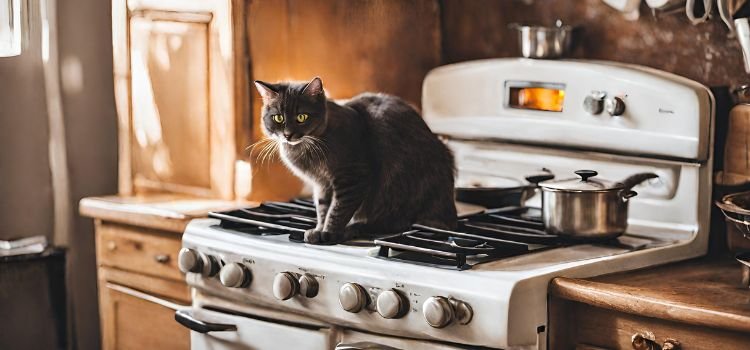
Conclusion
Understanding why your cat pees on the stove can be a perplexing challenge, however, figuring out what might be causing this behavior is crucial. Whether it’s territorial marking, an underlying health problem, or other reasons, identifying the root cause can help you address the issue and keep your home clean and odor-free.
Frequently Asked Questions On Why Does My Cat Pee On The Stove
To stop your cat from peeing on your stove, try placing aluminum foil or double-sided tape on the surface. You can also try using citrus scents or sprays around the stove to deter your cat. Make sure to clean any urine accidents thoroughly to remove the scent.
To get rid of cat urine smell from your stove, mix equal parts of vinegar and water in a spray bottle and spray it on the affected area. Let it sit for 10-15 minutes before wiping it off with a clean cloth.
Prevent your cat from jumping up on the stove by using deterrents such as aluminum foil or double-sided tape. Keep pots and pans off the stove when not in use and consider purchasing a stove guard. Provide your cat with alternative surfaces to climb on and use positive reinforcement when they avoid the stove.
Here’s a short and simple solution to stop your cat from peeing in the kitchen: First, clean up any existing messes thoroughly and remove any odors to discourage further incidents. Next, provide your cat with a proper litter box and make sure it is cleaned regularly. Limit your cat’s access to the kitchen by closing the door or using deterrents like motion-activated sprays or double-sided tape. Finally, consider consulting with a veterinarian to rule out any underlying medical issues causing the behavior.
There could be several reasons for this, such as territorial marking, stress or a medical issue.
By following the tips mentioned you can eliminate this problem and ensure the happiness and well-being of your furry friend.
Amazon and the Amazon logo are trademarks of Amazon.com, Inc, or its affiliates.
